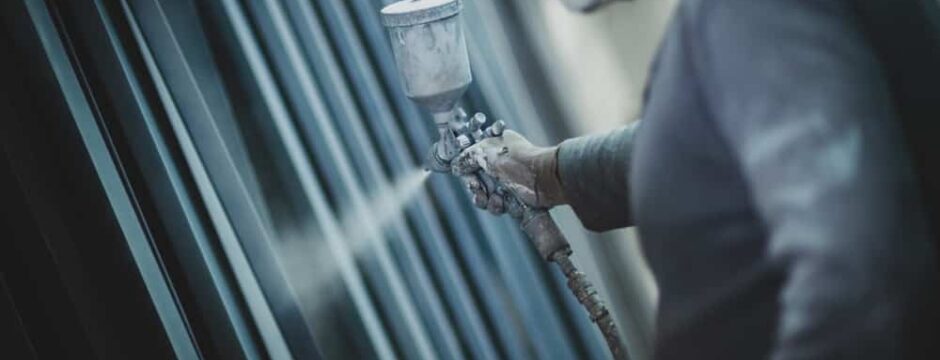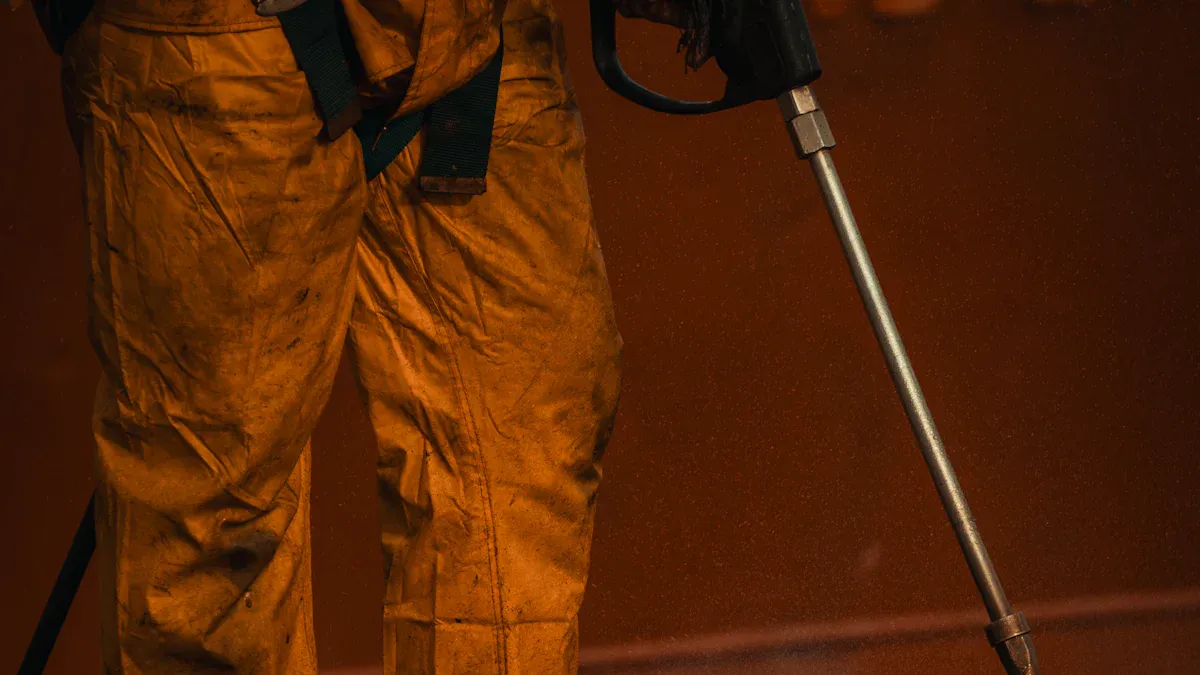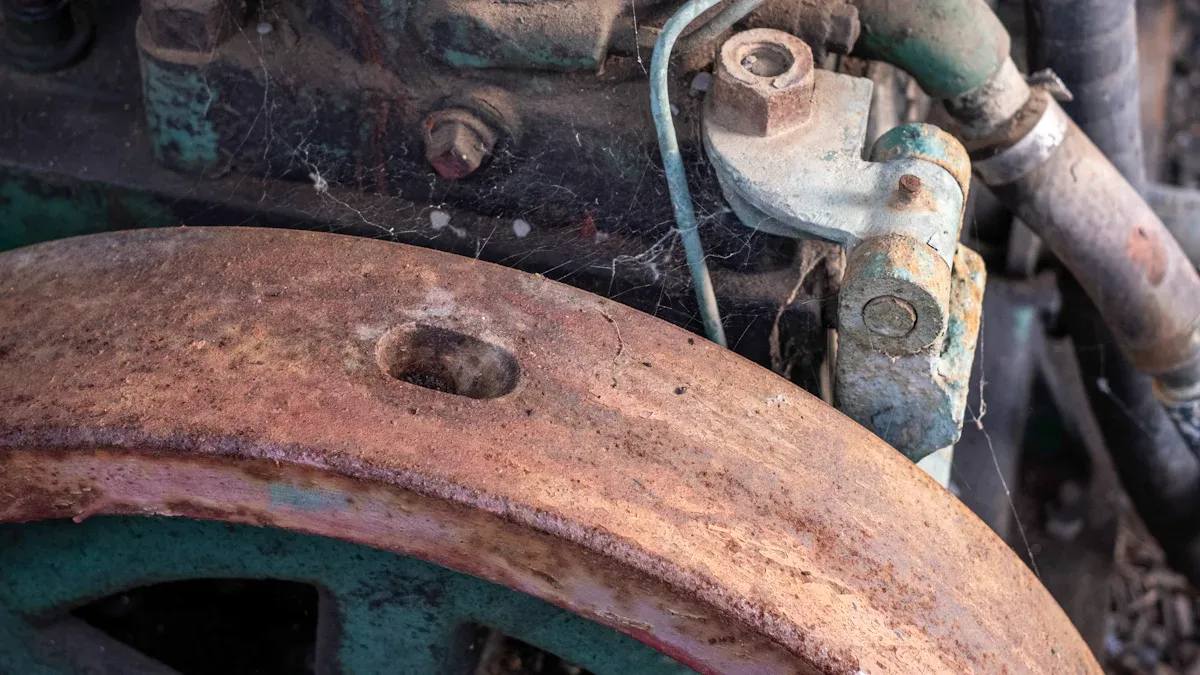

You need anti-corrosion paint in places with tough conditions. This paint gives strong protection from water, chemicals, and heat changes. Using anti-corrosion paint helps stop equipment from breaking. It saves you money and keeps your site safe. Factories use anti-corrosion paint to stop rust and help machines last longer. The right anti-corrosion paint makes your workplace safer and better protected. Anti-corrosion paint helps you save money on repairs and keeps your equipment working for more time.
Industrial Threats
Moisture and Humidity
Moisture and humidity can cause many problems for steel. Water in the air lands on steel and causes rust. Rust makes steel weaker and less safe. Humid places have faster rusting. You need strong protection against corrosion for your steel. If you ignore moisture, rust and damage will get worse.
Tip: Check steel often for rust spots. Fixing problems early stops bigger issues.
Chemical Exposure
Factories use chemicals that hurt steel. Acid and salt make steel rust and break down. Spills or leaks make steel weaker. You need coatings that block these chemicals. Industrial anti-corrosion paint protects steel from harm. Without this paint, steel equipment will not last long.
| Chemical Type | Effect on Steel Structure | Solution |
|---|---|---|
| Acid | Rusts steel quickly | Industrial coating |
| Salt | Makes steel weaker | Anti-corrosion paint |
| Solvents | Damages steel surface | Special coatings |
Abrasion and Wear
Machines and steel get scratched and worn down. Moving parts rub and damage steel surfaces. Damage lets water and chemicals reach steel. Rust forms fast when steel gets worn. You need coatings that resist scratching. These coatings keep steel strong and safe.
Temperature Extremes
Factories can be very hot or cold. Heat and cold make steel change shape. This causes cracks in the steel. Cracks let water and chemicals hurt steel. High-temperature paint protects steel from heat. Pick the right paint for your site. This keeps steel safe from rust and corrosion.
Anti-Corrosion Paint Protection

Barrier Mechanisms
Steel needs strong protection in tough places. Industrial coatings make a shield on steel. This shield stops water and air from touching steel. Using industrial paint coatings helps stop rust early. Epoxy coatings seal steel very well. Industrial paints keep steel safe from water and air. Direct to metal coatings stick right to steel. They make a hard layer that keeps steel strong. This layer stops damage from happening.
Tip: Make sure your industrial coatings cover all steel parts. If there are gaps, water can get in and cause trouble.
Types of Industrial Coatings
There are many kinds of industrial coatings you can use. Epoxy is a top choice because it fights chemicals and lasts long. Polyurethane is also good for industrial paint coatings. It protects steel from scratches and sunlight. You can use industrial paints on many surfaces in your factory. Some coatings work best in wet places. Others are better for hot areas. Direct to metal coatings save time since you do not need a primer. Epoxy coatings protect steel from spills and leaks.
| Type of Industrial Coating | Best Use | Key Benefit |
|---|---|---|
| Epoxy coatings | Chemical areas | Seals steel, resists chemicals |
| Polyurethane | Outdoor surfaces | Protects from UV and abrasion |
| Direct to metal coatings | Quick jobs | Bonds to steel, saves time |
Pick industrial paint coatings that fit your needs. Choosing the right coating is very important. If you pick the wrong one, steel can get weak and damaged.
Paint for Steel Structures
Paint for steel structures is important everywhere. You need industrial paints that last and protect steel from harm. Industrial coatings keep steel strong in factories and warehouses. Epoxy works well for steel beams and supports. Industrial paint coatings stop rust and protect steel from chemicals, water, and heat. Use industrial coatings on all steel surfaces. This keeps your equipment working and your site safe.
Note: Check steel structures often for damage. Put on new industrial coatings when you see problems.
Protecting Equipment Against Corrosion


Longevity and Durability
You want your steel machines and structures to last as long as possible. Industrial coatings help you reach this goal. When you use mechanical equipment paint, you add a strong layer to steel surfaces. This layer blocks water, chemicals, and air. Steel stays strong and does not rust quickly. You can see the difference in the life of protected surfaces. Industrial coatings keep steel safe in tough places. Mechanical equipment paint works well for steel beams, pipes, and tanks. You protect your facility’s longevity when you choose the right coatings. Steel with good paint lasts much longer than steel without protection.
Tip: Use mechanical equipment paint on all steel parts to make them last longer.
Reduced Maintenance Costs
Steel needs care to stay strong. If you use industrial coatings, you spend less money on maintenance. Mechanical equipment paint stops rust and damage before it starts. You do not need to fix steel as often. Industrial coatings help you avoid costly repairs. You save time and money by protecting equipment against corrosion. Steel with good coatings does not break down fast. You can plan your maintenance better and avoid surprises.
| Benefit | How It Helps You |
|---|---|
| Less maintenance | Fewer repairs needed |
| Lower costs | Save money |
| Longer steel life | More value |
Preventing Catastrophic Failures
Steel can fail if you do not protect it. Industrial coatings stop rust from eating away at steel. You keep your machines and structures safe. If steel breaks, your factory can stop working. Mechanical equipment paint helps you avoid big problems. You prevent accidents and keep your team safe. Protecting equipment against corrosion means you do not risk losing important machines. Industrial coatings give you peace of mind. You know your steel will stay strong and your site will run smoothly.
Note: Check steel often and add new coatings when you see damage. This keeps your factory safe.
Safety and Compliance
Industrial Standards
You must follow strict rules when you protect steel in industrial settings. Many industries have standards for coatings on steel. These standards help you keep your site safe and your equipment strong. When you use the right industrial coatings, you meet these rules. You show that you care about safety and quality.
Industrial standards often require you to test steel surfaces before and after you apply paint. You need to check for rust, cracks, or weak spots. If you skip these steps, your steel may not last. You also risk breaking the law. Good anti-corrosion practices help you pass inspections and avoid fines.
Note: Always read the latest industrial guidelines for steel protection. This keeps your site up to date and safe.
| Standard Name | What It Covers | Why It Matters |
|---|---|---|
| ISO 12944 | Steel paint systems | Stops rust, ensures safety |
| SSPC Standards | Surface prep for steel | Better paint bonding |
| ASTM D610 | Rust rating for steel | Checks coating quality |
Accident Prevention
You protect your team and your site when you use strong coatings on steel. Rust and weak steel can cause accidents. Machines may break, or steel beams may fail. You lower these risks with the right industrial paint.
If you keep steel strong, you stop dangerous situations before they start. You also make your workplace safer for everyone. Regular checks and new coatings help you spot problems early. You can fix small issues before they become big ones.
- Inspect steel often for rust or damage.
- Use industrial coatings that match your environment.
- Train your team on safe anti-corrosion practices.
Tip: A safe site starts with strong steel. Do not wait for problems to appear. Protect your steel now.
You protect steel from harsh environments when you use industrial anti-corrosion paint. Steel stays strong and safe. You save money because steel lasts longer and needs fewer repairs. Steel equipment works better and helps your site run smoothly. You lower risks and keep steel safe for your team. Steel needs regular checks and fresh coatings. You should look at your steel protection plan now. Make sure steel gets the care it needs. Strong steel means a safer and more efficient workplace.
Take action today. Review your steel protection measures and choose the best anti-corrosion strategies.

